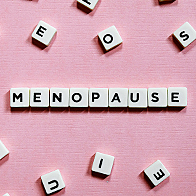Why Are Workplaces Failing Menopausal Women?

The mental and physical symptoms of menopause can be debilitating for women, creating difficulties at home and at work. One study found 70 percent of women did not feel comfortable talking to their employers about the issues they faced and their need for additional support.
In the United Kingdom alone, almost 1 million women have left their jobs due to menopausal symptoms.
I'll let that sink in. One million women.
This is at the point in a woman's career where they could be soaring in senior positions. But, instead, they are leaving the workplace due to menopause.
I don't know about you, but I find that statistic quite shocking. And, I'm not alone in that thought.
"The lack of support for menopausal women in the workplace is quite staggering, although it's an improving area," said U.K. TV and radio presenter and writer Mariella Frostrup. "I had no idea of the extent of the problem before writing the book "Cracking the Menopause."
The problem has become such a concern that the House of Commons Women and Equalities Committee has launched a new inquiry. The purpose is to scrutinize existing legislation and workplace practices to find out what is going wrong and if workplaces can do more to support women experiencing menopause.
But, I wanted to know more about why this is happening. Why menopausal women are leaving their positions and what more companies can do. So, I had a chat with the experts about it.
Why are menopausal women leaving their positions?
"Although 8 out of 10 menopausal women work, it's still unusual that menopause is recognized as a stage of life that might need some support. It's said that 1 in 4 will suffer serious symptoms, and that 42 percent of women consider leaving their job," stated Frostrup.
In fact, this number could be even higher. One survey looking at women with menopause in the workplace found that 72 percent of women in work feel unsupported, and 1 in 10 stated they have considered quitting their job.
'Losing a train of thought, forgetting names in the middle of important meetings, finding once easy tasks challenging to complete—they all significantly impact one's confidence.'
Meg Arroll, Ph.D., M.Sc., psychologist and author of "The Menopause Maze," delved into this topic a little further.
"In my practice, women report a range of cognitive symptoms that affect their ability to carry out their roles, on top of sleep disturbance and having to deal with embarrassing symptoms at work," Arroll explained.
"But, it is these cognitive difficulties that affect women's confidence in their occupational abilities," Arroll continued. "Losing a train of thought, forgetting names in the middle of important meetings, finding once easy tasks challenging to complete—they all significantly impact one's confidence. I've worked with women who want to leave their positions as they simply feel they cannot meet the job requirements anymore. But with appropriate support, this is not, and should not, be the case."
"It is hard enough being an older working woman in an ageist society with a youth obsession," Frostrup added. "But if menopause robs you of your confidence, denies you sleep, [or] saps your energy, it's even harder to keep going with a cheery, lipsticked smile on your face, as society demands. Legislation is urgently needed."
Does discrimination in the workplace toward menopausal women exist?
"In the U.K., there's certainly an increase in employment tribunals where menopause is mentioned," stated Deborah Garlick from Henpicked: Menopause in the Workplace, a leading company raising awareness on this issue. (For U.S. readers, employment tribunals are public bodies that convene to hear disputes between employers and employees and make legally binding rulings.)
"It is still a small number, but we're expecting that to increase further. This is the tip of the iceberg—many will be settled before a tribunal to manage repetitional risks or may be resolved as part of an internal grievance process," she explained.
"The discrimination here may be more subtle than overt," added Arroll. "For instance, if someone is demonstrating symptoms [like those mentioned above], a performance issue may be triggered rather than appropriate support because, on the face of it, this may seem the most appropriate action."
There is also the added problem that many women do not feel able to speak out. Arroll stated that the fear of discrimination may discourage women from disclosing their negative workplace experience.
Is there a secondary effect on workplace productivity, the gender pay gap and the gender pension gap?
"There is little research to say that it has an effect on workplace productivity," Garlick said. "However, with regard to the gender pay gap and gender pension gap—absolutely."
Both Arroll and Garlick shared some insightful statistics:
- In a survey of 3,275 women ages 40 to 65, 1 in 5 took time off to deal with menopausal symptoms, and 1 in 50 was on long-term sick leave. This has a substantial negative impact not just on the organization, but the individual, her family and the wider economy.
- The Health and Her survey found that 370,000 working women, ages 50 to 64, either left or were planning to leave work because they were struggling with menopause symptoms at work. This is 8.2 percent if we take this as a proportion of the current number of 50- to 64-year-old women in the U.K. who are in paid employment.
- Using the latest dataset available, Prospect produced an estimate of 40.3 percent for the gender pension gap in 2018–19. To put this into context, it is well over twice the latest estimate of the gender pay gap of 15.5 percent in 2020. The widening gender pension gap is estimated to be partly due to women leaving work or reducing hours at this stage of their lives.
"Continued and extended economic activity is essential for older women if they are to become more reliant on their own income into older age," Garlick said.
"And there are more than financial benefits here," Garlick continued. "There is evidence that paid employment contributes to improved mental health amongst older women because it is an important source of both social support and self-esteem."
What is the U.K. government doing about this problem?
As touched on above, the House of Commons Women and Equalities Committee has launched a new inquiry.
"Our inquiry into menopause and the workplace in many ways complements a raft of work going on both in Parliament and outside to highlight the issues many women face with menopausal symptoms," stated The Right Honourable Caroline Nokes, Member of Parliament for Romsey and Southampton North, and Chair of the Women and Equalities Select Committee.
"It is far too little spoken about, and too many women neither know what to expect, nor that the strange symptoms they are encountering are anything to do with the menopause. But it can make it very difficult to continue in work for some," Nokes continued.
"I have been struck by the amount of evidence we have received from women who have been directly discriminated against," she added.
Despite the evidence and examples, many women fear speaking out at all.
"Some women ask that their evidence be kept anonymous so that they will not face further repercussions from employers," Nokes stated. "That is horrific, that women fear being penalized for speaking out."
The inquiry aims to look at both good practice and bad. It will investigate current legislation, recent tribunals and what policies workplaces have in place.
"We know that cases are being brought before tribunals, but we are asking how that process has worked," Nokes explained. "We want to know whether there needs to be legislation specifically in this area and what more can be done by employers to help their staff.
"Of course, we are interested in the examples of good practice as well as bad," Nokes said. "It would be great to celebrate the forward-thinking companies who are making sure they are not losing experienced women at the top of their career."
What more can be done?
Arroll explained that "at present, the main type of support seen are programs where the woman is essentially still the 'problem' that needs to be fixed—rather than any meaningful change within the organization.
"Women are scared to discuss menopause with their managers for fear of negative consequences, so they suffer in silence, often taking work home with them, which blurs boundaries and leads to burnout, in which this vicious cycle directly worsens physical symptoms," Arroll explained.
She emphasized that while it's important women have workplace support, a larger macro-level change is needed to limit workplace inequality due to a biological process that half the population goes through.
However, it's important to remember that it is not all bad news.
"A lot and many employers are already brilliant at providing menopausal support in the workplace," Garlick said, "and the first employers like HSBC UK and M&S Bank have achieved Menopause Friendly Accreditation. Essentially, it's about creating a culture where menopause can be talked about openly, and putting the right support in place.
"The reality is that these campaigns are incredibly popular with colleagues, cost relatively little to do and pay back quickly," Garlick continued. "The majority of women do not need a lot of support—just being able to talk about it is a relief. So it's a win-win: good for colleagues and good for the employer."




















